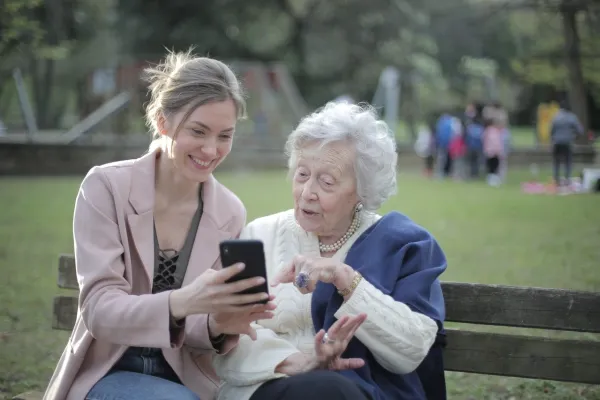Diversity at St Louis brings greater understanding and empathy
Reading this and thinking of a career change? Bring your skills to a business development role in home care
The home care team at St Louis come from many different work and cultural backgrounds, with a range of work and life experience. We value this diversity, because the community we serve and care for is also diverse.
Regardless of backgrounds and work/life experience, one area we remain steady and consistent about is in the way with which we deliver our care. With more than 75 years in caring for older South Australians, our four pillars or values form the foundation of our care, from the moment our receptionist answers your first phone call, to the delivery of care in your home.
One of the first people our home care clients talk to is our Business Development Manager (BDM). Our BDM represents all facets of our home care business and is skilled at asking the right questions to help potential new clients navigate the aged care system with the least amount of stress.
What’s involved in being on the home care team at St Louis? Read on to find out.
The most important skills you need to help older people at home
You need to have a genuine desire to help people, and to assist them to live the best life they can with the limitations they have. Sharing your knowledge and experience to help make people’s lives better is also an essential trait, because it is this generous creativity that will help you find solutions to everyday problems while you’re in people’s homes.
Some of the other skills and traits that you need are:
- Good listening skills – sometimes our clients cannot always tell us exactly what they want, or they may not understand what home care services offer. By learning to listen closely, you’ll discover more of their needs.
- Perceptiveness – to identify how receptive people are in getting some help at home. Some people are less ready than others and it may require more time and information to help them reach a stage where they are comfortable.
- Emotional intelligence – waiting for the right time to help another, or gently guiding people to solutions they may initially resist. Understanding that your role is not to direct, but to support, and knowing that any resistance that comes is just a part of the care journey.
- Understanding the aged care industry – when you know what types of funding programs are available in the industry then you’ll be able to better help your clients.
- Communication - explaining a complex industry with systems and processes in a way that is easy to understand for the client.
- Lived experience – if you have had the experience of obtaining care for an elderly relative, this helps another person looking for the same.
What people are most concerned about when thinking about help at home
Empathy and compassion are essential when working with people who are going through life changes. Older people feel vulnerable when having to ask for help, this is a new stage of life so a gentle guiding approach will help you form a lasting and positive relationship with them. At the start of a home care journey, clients are often concerned for several reasons and it is up to us to help them come to peace with these concerns:
- They may feel they are losing control of their independence, but actually home care helps them maintains their independence and live at home for as long as they want to.
- They may be uncomfortable about strangers in their home. We take great care to demonstrate that we work in partnership with our clients and their families, now and in the future, that we deliver our care based on our four values, and that the care is driven by their choices. We encourage people to tell us if they are not happy or concerned so that we can address these promptly.
- Home care does not lead to moving to a nursing home. We reassure our clients that home care empowers them, and gives them a longer and better quality of life at home for as long as they want.
Understanding what is happening for both clients and their families
Both the parent and their family often feel anxious about transitioning to home care support. You can help alleviate these feelings. Everything you say is so important at this point and can help that person feel safe and comfortable.
Older people who are needing support will often feel anxious and embarrassed about having to ask for help, and even silly for having to ask for it. They have been in control all their life, and now they are at a crossroad, having to ask for help. If there is any memory loss, this will increase their anxiety even more. Their families will be experiencing a mixture of guilt, worry and stress because they may have their own kids to look after, work to do, community activities to maintain. They are busy, and they also need help to be able to help their elderly loved ones.
Call St Louis Home Care to find out how you can bring your skills to aged care
You may have a background in nursing, child care, customer service, retail, teaching, facilitation, events, training or sales. Each one of these roles has skills that can be used in home care. Please call us on 08 8332 0950 to discuss a career in home care. You may be surprised at how many valuable skills you have already that are needed in the world of home care.
Want to learn more?
